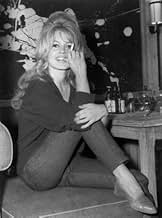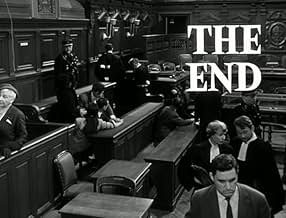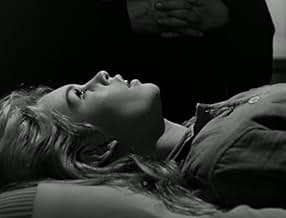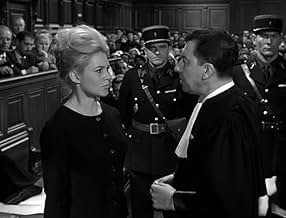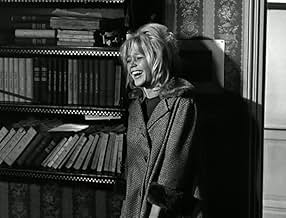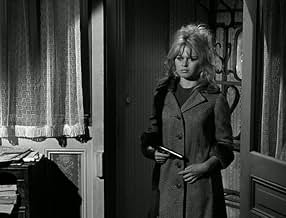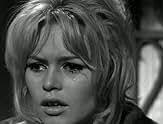Una chica, la oveja negra de la familia, se muda a París con su hermana. Tras la muerte de su joven amante, es acusada de asesinato, sin que esté claro si este fue un crimen pasional o preme... Leer todoUna chica, la oveja negra de la familia, se muda a París con su hermana. Tras la muerte de su joven amante, es acusada de asesinato, sin que esté claro si este fue un crimen pasional o premeditado.Una chica, la oveja negra de la familia, se muda a París con su hermana. Tras la muerte de su joven amante, es acusada de asesinato, sin que esté claro si este fue un crimen pasional o premeditado.
- Dirección
- Guionistas
- Elenco
- Nominado a 1 premio Óscar
- 3 premios ganados y 2 nominaciones en total
- Daisy
- (as Barbara Sohmers)
Opiniones destacadas
Indeed, the truth is that Henri-George Clouzot's film of the same name has been sentenced to decades of cinematic oblivion, 7 reviews on IMDb says enough. And the injustice is even more cruel because the movie stands alone as a masterpiece of the genre in a period full of gripping courtroom dramas such as "12 Angry Men", "Anatomy of a Murder", "Judgment at Nuremberg" or "Inherit the Wind" where the verdict mattered less than the quest for truth it initiated and the statements it spoke about the impact of human perceptions in the exercise of justice.
This is why the main question in "The Truth" is not 'who killed', not even 'how', but 'why?', the film takes place during the trial ensuing the murder of Gilbert Tellier, Sami Frey as a talented, handsome and ambitious conductor by his beautiful girlfriend, Dominique Marceau, who tried to kill herself right after. Dominique is played by a 25-year old Brigitte Bardot, in a breakthrough dramatic performance, that elevated her status to the most promising actress of her generation rather than a one-dimensional bimbo.
Yet Bardot's sex-appeal is still significant to the story as Clouzot intelligently exploits it to highlight the sulfurous past of a young idle girl who used her body as an asset, to live without working, without prostituting herself either. Indeed, Dominique Marceau isn't the typical slut: there is in her attitude something that nonchalantly confines to pathos, embodying the unease of the 60's youth, being in her own feminine and naughty way, a sort of rebel without a cause. And the intent of Clouzot is less to make a social commentary but to explore the different facets of a seemingly obvious personality.
The trial becomes the setting for a gripping character study, revisiting the life of Dominique Marceau before the killing from the perspective of two different counselors, played by two giants. Paul Meurisse denounces Dominique's laziness, the jealousy she always felt toward her more studious sister Annie, and a bunch of former lovers come to belie her faithfulness and love for Tellier, whom she murdered by vengeance, because she couldn't stand his relationship with Annie. As for her suicidal attempts, there were calculated acts since she was always sure someone would come at time to save her.
On the other side, Dominique's lawyer, played by Charles Vanel, tends to demonstrate that the murder was a passioned crime, an act of desperation from a tormented woman, as Dominique truly loved Gilbert and couldn't imagine life without him. One of the film's greatest delights is the verbal duel between the two actors, and their interactions that remind some of the great courtroom dramas, when two respectable adults, even friends, become visceral enemies during the trial, James Stewart and George C. Scott, Spencer Tracy and Frederic March or more recently, Tom Cruise and Kevin Bacon.
The interest of the Meurisse/Vanel antagonism is to keep a shadow of mystery around Bardot's real personality, a villainous killer or a woman victim of her passion. And as the story progresses, Dominique's portrait, originally painted in black and white reveals many shades of gray while her victim, the good-hearted Tellier becomes less and less innocent. The story opens in Paris where Bardot embodies the youth's ennui, living like a sort of social parasite whose only excuse is to use her body as thin consolation. Yet, she can't be a slut because she's totally unaware of conventions, she's beyond them, and doesn't even feel guilty.
Naturally, the inevitable happens, Tellier, Annie's friend falls in love with the sensual provincial girl. It's the typical love at first sight, but it's handled in a very talented way by Clouzot who's a real craftsman when it comes to human emotions. Hefirst meets Dominique when she's lying naked, topless in her bed, swinging her beautiful behind to some mambo music, she incarnates the luscious fruit, she's everything her sister is not, that's what makes her so obsessively desirable. Then the romance between Marceau and Tellier turns into a series of passion, deception, treachery and arguments like only a director like Clouzot could have painted without falling in a sentimental or either Manichean trap.
And as we get closer to the murder, we understand the roots of Dominique's behavior and her suicidal attempts carry deepest significances, rather than an act of despair, they crystallize the vulnerability of a girl that tries to find her place in society, torn between the true love of Gilbert and a sort of paradoxical innocence that raises above her lust. It feels strange but when you keep an eye on Bardot's performance, you'd think twice before calling a girl, a slut. Bardot was the perfect choice for the role and her breakdown transcends the sensual contours of her delicious body and can touch any soul.
After watching the film, I guess the reason of its lack of notoriety is the fact that H-G Clouzot is renowned for several masterpieces of the thriller genre, blending it with elements of horror, mystery or police procedural, therefore, a movie like "The Truth" comes too late in his filmography and doesn't meet the same recognition than the acclaimed "The Crow", "Quai des Orfèvres", not to mention the classic "Wages of Fear" and"Diaboliques". But on its own, it's a magnificent exploration of the human soul, a masterfully written courtroom drama, and still a Clouzot's film with its dark and pessimistic undertones, and the eternal cloud of ambiguity that envelops the character's personalities.
Bardot lived a romance with Frey after the film, and she was so affected by the experience that like her character, she tries to commit suicide, if a film haunted its own actors, it gives you an idea about the psychological impact it might have on you
Brigitte Bardot is a young girl on trial for the murder of her lover. The prosecution perceives her as a cold-hearted, calculating killer. The defense sees her as a heartbroken, confused young girl pushed to a desperate act. What we get is a suspenseful peeling of the truth, but not the truth in terms of facts. We get to the root of the truth in terms of feelings. I imagine if you were to hook electrodes to your brain and study which areas light up when watching these films, "Rashomon" would light up your frontal lobe (logic center) while "La vérité" would light up that tiny peanut at the core of your head, the amygdala (emotional center).
The point being made, and unforgettably expressed in a passionate monologue by Ms. Bardot, is that hard facts aren't the only component of truth. She roars: "You sit up there, in your ridiculous robes, and you want to judge but you have never lived! Never loved! You hate me because you are dead! Dead!"
I challenge anyone to watch that scene and tell me that Brigitte Bardot isn't one of the finest actors. Even at the young age of 25, thrust into an intimidating arena alongside theatrically trained, veterand actors and one of the most notoriously perfectionist directors of cinema, she really carries the show. The role had originally been written for respected actor Sophia Loren, but Clouzot rewrote the entire story for Bardot after she was cast. Indeed she seemed to be made for this role and vice versa; the role was written for her (literally). In interviews Bardot stated that with no formal acting training she had to rely on convincing herself that she actually was the character Dominique. And this itself leads to a bizarre case of life imitating art (or the other way around?) where, feeling judged and persecuted by the press, Brigitte had a severe breakdown and shocking incident on her birthday in 1960 just weeks before the film's release. Google it after you watch the movie. Funny how even the press's & haters' reaction to the incident mirrored the prosecution's reaction to similar incidents in the tale of Dominique.
This film is a landmark with regard to emotional storytelling. And it's a landmark with regard to our human experience, attempting to understand this misshapen thing called reality. If you learned something from "Rashomon" then don't consider your education complete until you watch this essential companion film.
THE TRUTH – included in the all-time top 3,000 movies ranked by the "Wonders In The Dark" website – was the only title involving either to be nominated for the Best Foreign Language Film Oscar: incidentally, it is preceded by the Columbia logo and, apparently, was simultaneously shot in English as per contemporary posters!; for what it is worth, the film deservedly missed out to Ingmar Bergman's beautifully stark parable THE VIRGIN SPRING (1960) – even if they actually emerged joint winners at the Golden Globes! Anyway, what we have here is the trial of a crime of passion (with the star herself in the dock), the backstory of which is then seen in flashback – triggered off by the interrogations of various witnesses. Clouzot managed to rope in an impressive supporting cast for his plethora of characters: Charles Vanel as Bardot's practiced Defense Counsel, Paul Meurisse as the showy Prosecutor – incidentally, both these actors had already appeared together for Clouzot in one of his greatest works, DIABOLIQUE (1955) – and youngsters Sami Frey and Jacques Perrin among the uninhibited (what else?) protagonist's numerous lovers, the former being also the victim in the case.
The director's renowned clinical eye for detail is well in evidence throughout – but the film's two sections do not necessarily jell in this particular instance (perhaps tellingly, the 122-minute movie had as many as six scriptwriters assigned to it!). The narrative proper, then, seems to belong to the 'wasted youth' trend kickstarted by Federico Fellini's I VITELLONI (1953); indeed, despite their highbrow aspirations (musician Frey juggles a relationship with Bardot and her 'saintly' elder sister, all the while attempting to set up his own orchestra!), these singularly colourless personages come across as low-lifes more than anything else: the crime itself, followed immediately by the heroine's attempted suicide, is easily the standout here. Conversely, the backhanded tactics prevalent in the over-crowded courtroom lend much cynical enjoyment – thus countering the necessarily static nature of the cinematography during these sequences.
Still, the film is considered as the one in which the star gave her best performance (she even won the Italian equivalent of the Oscar for it as Best Foreign Actress): though the events leading up to the night of the crime and where the real guilt lay (hence the title) are hotly debated by both sides, it is inconceivable to accuse Frey (who could hardly be blamed for lusting after Bardot) over her (whose feelings for him – whether genuine or merely to spite her "square" sibling – are never properly defined) which is perhaps why the trial ends abruptly as it does! In retrospect, the movie can be seen to have much in common with the afore-mentioned "Inferno" – whose troubled shoot was delineated in a feature-length documentary released in 2009 (after Claude Chabrol had already impressively refashioned Clouzot's original script for his own 1993 effort L'ENFER).
¿Sabías que…?
- TriviaDirector Henri George Clouzot pushed his actors and actresses so hard - Sami Frey and Jacques Perrin were about to hit him in the face - that Brigitte Bardot tried to commit suicide after the shooting. She was too much implicated, involved in the Dominique character. She also said that this movie was the only one in her career which she was really proud of.
- Citas
The Prosecuting Attorney: You spent weeks seducing him, didn't you? Weeks!
Dominique's Attorney: Objection! What length of time should she have spent? Is there any legal limit on how long a seduction ought to take?
- ConexionesFeatured in The Art of Arts TV: The Single Arts Film (2008)
- Bandas sonorasL'Oiseau de Feu
Written by Igor Stravinsky
Selecciones populares
- How long is The Truth?Con tecnología de Alexa
Detalles
- Fecha de lanzamiento
- Países de origen
- Idioma
- También se conoce como
- The Truth
- Locaciones de filmación
- Rue Saint-Antoine, Paris 4, París, Francia(Dominique hit by a bus)
- Productoras
- Ver más créditos de la compañía en IMDbPro
- Tiempo de ejecución2 horas 8 minutos
- Color
- Relación de aspecto
- 1.66 : 1
Contribuir a esta página


